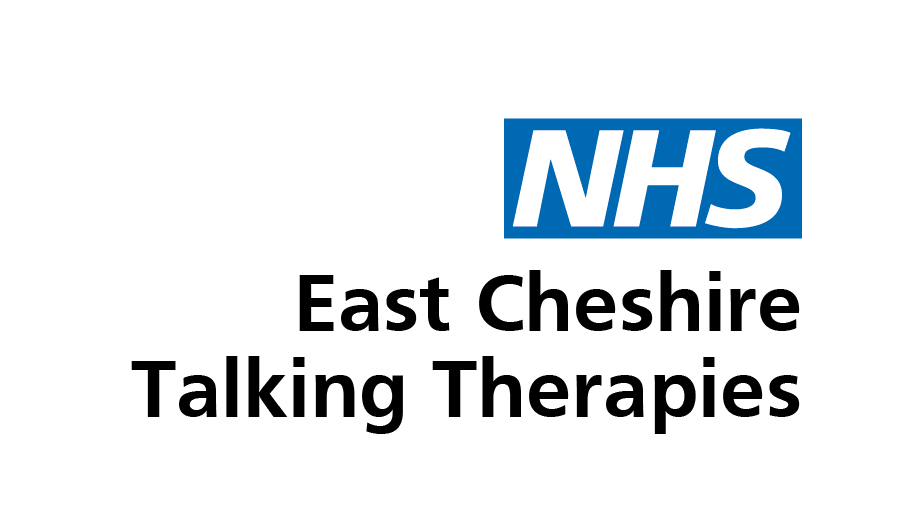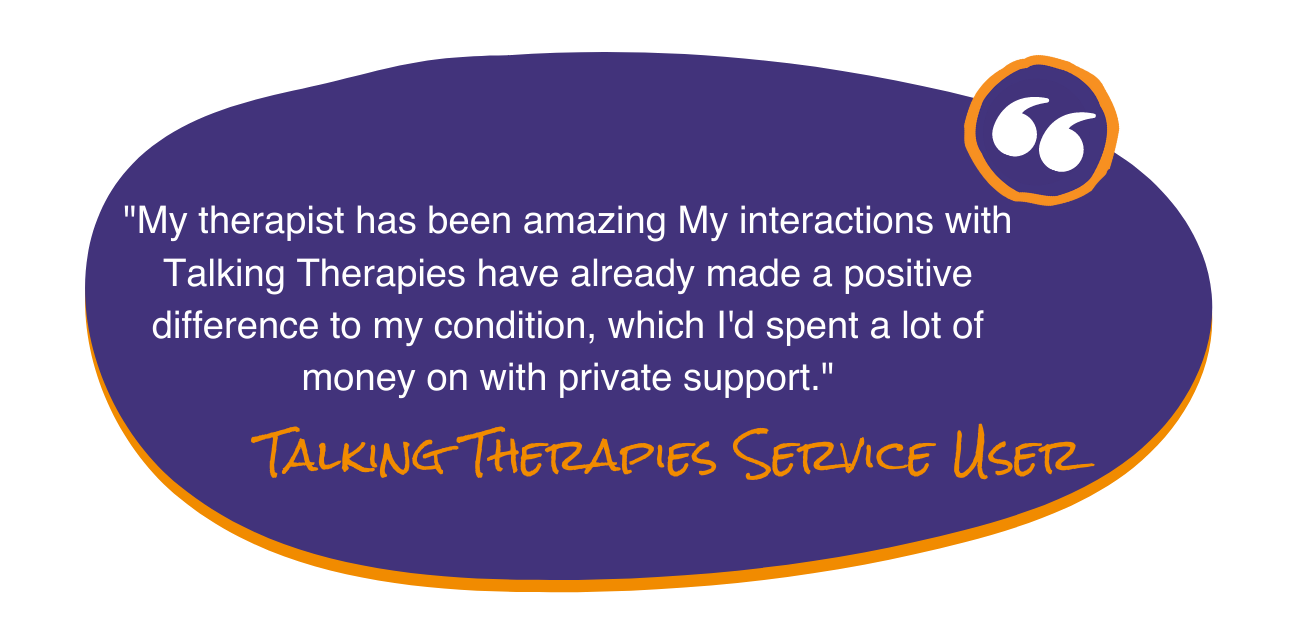How can we help?
NHS East Cheshire Talking Therapies provide free psychological therapies to help with common mental health difficulties. Our team includes Psychological Wellbeing Practitioners, Counsellors and Cognitive Behavioural Therapists, supported by an administration team.
Therapy can be provided one-to-one, in a group, over the phone, via video call or online.
Who are we for?
NHS East Cheshire Talking Therapies is for anyone aged 16+ who is registered with a GP in East Cheshire (Alderley Edge, Bollington, Chelford, Congleton, Disley, Handforth, Holmes Chapel, Knutsford, Macclesfield, Poynton and Wilmslow). Our team are based all over East Cheshire in various community venues.
What can we help with?
We offer support for a range of difficulties including: depression, anxiety, stress, panic, sleep difficulties, phobias, post traumatic stress disorder, obsessional compulsive disorder, social anxiety, loss and bereavement, relationship difficulties, significant life changes, menopause, adjustment issues, low self-esteem, trauma and abuse.
If you have a long term condition such a diabetes, chronic pain, chronic fatigue syndrome, long Covid, cardiovascular disease, we can offer specialist psychological support.
Depression
Depression is a feeling of low mood that lasts for more than 2 weeks and affects your everyday life. You can feel down, sad and tearful, and have little interest or pleasure in doing the things you normally do. You may also feel guilty or bad about yourself, or that you are failure and have let yourself or your family down. Depression can cause you to feel tired and have little energy, to sleep badly, to eat too much or too little, and to find it hard to concentrate. In its mildest form, being depressed may not stop you from doing things, but it can make everything feel harder to do and less worthwhile. At its worst, severe depression can make you feel that life is no longer worth living.
Generalised anxiety
Most of us have worries from time to time but you may find yourself worrying about a lot of different things, and feel you can’t control your worrying. People with generalised anxiety tend to feel nervous, anxious or on edge on most days and can find it hard to remember the last time they felt relaxed. As soon as one worry goes away, another may appear about something else. Being anxious and worried all the time can make you feel restless, easily tired and irritable. You may also have difficulties concentrating, have tension in your muscles, and be sleeping badly.
Panic attacks
Panic attacks are sudden attacks of extreme anxiety (or fear). Signs include a racing heartbeat, sweating, trembling or shaking, feeling unable to breathe, choking sensations, chest pains, nausea, or feeling dizzy and faint. You may fear losing control, going ‘crazy’, having a heart attack, or fear that some other bad thing is going to happen.
Panic attacks may be one off or occasional, or they could happen over and over again. Often, panic attacks come out of the blue, when you’re not in danger, and for no reason. You may find that you worry a lot about having another panic attack, and this can set off more attacks, or lead you to avoid situations in case you have a panic attack.
Agoraphobia
Agoraphobia means a fear of places or situations which might be difficult to escape from. You may feel very anxious when going into shops, being in crowds, or when travelling on trains, buses or planes. This can lead you to avoid certain places and situations, or you may have things you do to help you cope, such as shopping online, or asking other people to do your shopping for you, or having someone else with you when you go out. People with agoraphobia often experience panic attacks too.
Social anxiety
Social anxiety, is more than just ‘shyness’. People with social anxiety can be fearful and embarrassed when with other people and so avoid things such as shopping or speaking on the phone – they may even have panic attacks in those situations. Many of us worry sometimes about social situations, but if you have social anxiety, you’ll worry a lot about them before, during and afterwards. Being embarrassed or looking stupid may be among your worst fears, and you’re likely to fear being judged by other people and doing or saying something you think will be embarrassing, such as blushing or sweating. Because of this, you may avoid doing things that involve being around people.
Health anxiety
Health anxiety is when you spend so much time worrying you’re ill, or about getting ill, that it starts to take over your life. It is characterised by: frequently check your body for signs of illness, such as lumps, tingling or pain, consistently asking people for reassurance that you’re not ill, worry that a doctor or medical tests may have missed something, obsessively look at health information on the internet or in the media and/or avoiding anything to do with serious illness, such as medical TV programmes. You may worry about having a specific illness or it may be more of a general feeling that ‘something isn’t right’.
Post-traumatic stress disorder (PTSD)
Are you bothered by thoughts or images that you can’t easily stop or that don’t make sense to you? For example, thoughts about being contaminated by germs, thoughts that you may have hurt someone when you didn’t want to, or thoughts that harm will come to someone you love? If these thoughts are followed by actions that you do over and over again or can’t easily stop, such as washing your hands to make sure they are clean, going back to places to make sure you haven’t hurt someone, or counting or repeating a phrase in your head to stop harm coming to others, then you may have obsessive-compulsive disorder, commonly known as OCD.
Phobias
A phobia is a strong fear or anxiety which is set off by being in a certain situation or being near a certain object. Many of us have fears about certain situations or objects, but it becomes a phobia if the fear doesn’t match the danger, it lasts for more than six months, and it affects how you live your day-to-day life. Common phobias include being near certain animals (such as spiders, dogs or snakes), heights, flying, eating certain foods, having an injection, seeing blood or vomit, or fearing you will vomit yourself. Phobias can affect you on a daily basis, especially if you begin to organise your life around avoiding the thing that you fear.
Loss & Bereavement
Most people experience grief when they lose something or someone important to them. Bereavement and loss can cause many different symptoms and they affect people in different ways. There’s no right or wrong way to feel. Some of the most common symptoms include: shock, numbness, sadness, crying, tiredness, exhaustion, anger, guilt.
You may experience grief for a number of reasons such as someone you are close to dying, someone you are close to moving away, a relationship breakdown, loss of a job, home or significant changes to your health.


